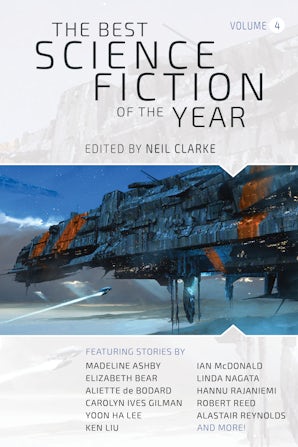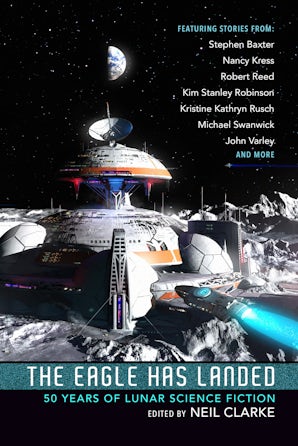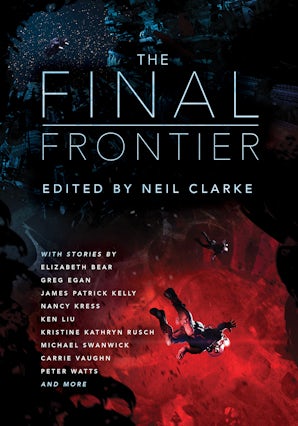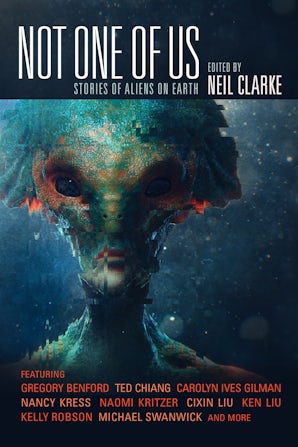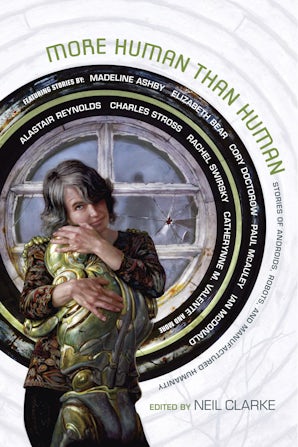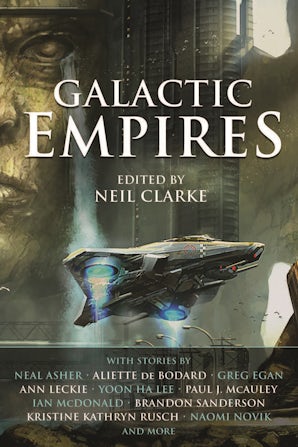
Galactic Empires
Neil Clarke
- 636 Pages
- January 17, 2017
- ISBN: 9781597808842
- Imprint: Night Shade Books
- Trim Size: 6in x 9in x 0in
Description
“Over all this anthology is mostly hits, remarkably few misses. Highly recommended.”—N.K. Jemisin, New York Times Book Review
Neil Clarke, publisher of the award-winning Clarkesworld magazine, presents a collection of thought-provoking and galaxy-spanning array of galactic short science fiction.
From E. E. "Doc" Smith’s Lensman, to George Lucas’ Star Wars, the politics and process of Empire have been a major subject of science fiction’s galaxy-spanning fictions. The idiom of the Galactic Empire allows science fiction writers to ask (and answer) questions that are shorn of contemporary political ideologies and allegiances. This simple narrative slight of hand allows readers and writers to see questions and answers from new and different perspectives.
The stories in this book do just that. What social, political, and economic issues do the organizing structure of empire” address? Often the size, shape, and fates of empires are determined not only by individuals, but by geography, natural forces, and technology. As the speed of travel and rates of effective communication increase, so too does the size and reach of an Imperial bureaucracy. Sic itur ad astraThus one journeys to the stars.”
At the beginning of the twentieth century, writers such as Kipling and Twain were at the forefront of these kinds of narrative observations, but as the century drew to a close, it was writers like Iain M. Banks who helped make science fiction relevant. That tradition continues today, with award-winning writers like Ann Leckie, whose 2013 debut novel Ancillary Justice hinges upon questions of imperialism and empire.
Here then is a diverse collection of stories that asks the questions that science fiction asks best. Empire: How? Why? And to what effect?
Table of Contents:
- Winning Peace” by Paul J. McAuley
- Night’s Slow Poison” by Ann Leckie
- All the Painted Stars” by Gwendolyn Clare
- Firstborn” by Brandon Sanderson
- Riding the Crocodile” by Greg Egan
- The Lost Princess Man” by John Barnes
- The Waiting Stars” by Aliette de Bodard
- Alien Archeology” by Neal Asher
- The Muse of Empires Lost” by Paul Berger
- Ghostweight” by Yoon Ha Lee
- A Cold Heart” by Tobias S. Buckell
- The Colonel Returns to the Stars” by Robert Silverberg
- The Impossibles” by Kristine Kathryn Rusch
- Utriusque Cosmi” by Robert Charles Wilson
- Section Seven” by John G. Hemry
- The Invisible Empire of Ascending Light” by Ken Scholes
- The Man with the Golden Balloon” by Robert Reed
- Looking Through Lace” by Ruth Nestvold
- A Letter from the Emperor” by Steve Rasnic Tem
- The Wayfarer’s Advice” by Melinda M. Snodgrass
- Seven Years from Home” by Naomi Novik
- Verthandi’s Ring” by Ian McDonald
Skyhorse Publishing, under our Night Shade and Talos imprints, is proud to publish a broad range of titles for readers interested in science fiction (space opera, time travel, hard SF, alien invasion, near-future dystopia), fantasy (grimdark, sword and sorcery, contemporary urban fantasy, steampunk, alternative history), and horror (zombies, vampires, and the occult and supernatural), and much more. While not every title we publish becomes a New York Times bestseller, a national bestseller, or a Hugo or Nebula award-winner, we are committed to publishing quality books from a diverse group of authors.
From E. E. "Doc" Smith’s Lensman, to George Lucas’ Star Wars, the politics and process of Empire have been a major subject of science fiction’s galaxy-spanning fictions. The idiom of the Galactic Empire allows science fiction writers to ask (and answer) questions that are shorn of contemporary political ideologies and allegiances. This simple narrative slight of hand allows readers and writers to see questions and answers from new and different perspectives.
The stories in this book do just that. What social, political, and economic issues do the organizing structure of empire” address? Often the size, shape, and fates of empires are determined not only by individuals, but by geography, natural forces, and technology. As the speed of travel and rates of effective communication increase, so too does the size and reach of an Imperial bureaucracy. Sic itur ad astraThus one journeys to the stars.”
At the beginning of the twentieth century, writers such as Kipling and Twain were at the forefront of these kinds of narrative observations, but as the century drew to a close, it was writers like Iain M. Banks who helped make science fiction relevant. That tradition continues today, with award-winning writers like Ann Leckie, whose 2013 debut novel Ancillary Justice hinges upon questions of imperialism and empire.
Here then is a diverse collection of stories that asks the questions that science fiction asks best. Empire: How? Why? And to what effect?
Table of Contents:
- Winning Peace” by Paul J. McAuley
- Night’s Slow Poison” by Ann Leckie
- All the Painted Stars” by Gwendolyn Clare
- Firstborn” by Brandon Sanderson
- Riding the Crocodile” by Greg Egan
- The Lost Princess Man” by John Barnes
- The Waiting Stars” by Aliette de Bodard
- Alien Archeology” by Neal Asher
- The Muse of Empires Lost” by Paul Berger
- Ghostweight” by Yoon Ha Lee
- A Cold Heart” by Tobias S. Buckell
- The Colonel Returns to the Stars” by Robert Silverberg
- The Impossibles” by Kristine Kathryn Rusch
- Utriusque Cosmi” by Robert Charles Wilson
- Section Seven” by John G. Hemry
- The Invisible Empire of Ascending Light” by Ken Scholes
- The Man with the Golden Balloon” by Robert Reed
- Looking Through Lace” by Ruth Nestvold
- A Letter from the Emperor” by Steve Rasnic Tem
- The Wayfarer’s Advice” by Melinda M. Snodgrass
- Seven Years from Home” by Naomi Novik
- Verthandi’s Ring” by Ian McDonald
Skyhorse Publishing, under our Night Shade and Talos imprints, is proud to publish a broad range of titles for readers interested in science fiction (space opera, time travel, hard SF, alien invasion, near-future dystopia), fantasy (grimdark, sword and sorcery, contemporary urban fantasy, steampunk, alternative history), and horror (zombies, vampires, and the occult and supernatural), and much more. While not every title we publish becomes a New York Times bestseller, a national bestseller, or a Hugo or Nebula award-winner, we are committed to publishing quality books from a diverse group of authors.
Authors
Neil Clarke is the award-winning publisher and editor in chief of Clarkesworld magazine, winner of three Hugo Awards for Best Semiprozine, and the editor of The Best Science Fiction of the Year, an ongoing anthology series from Night Shade Books.
Reviews
“Over all this anthology is mostly hits, remarkably few misses. Highly recommended.”—N.K. Jemisin, New York Times Book Review
“Ambitious and impressive . . . I can honestly say that it's been a while since I've read a science fiction anthology that is as good and diverse as this one. . . . one of the best and most captivating science fiction anthologies of the year. Highly recommended!”—Risingshadow
“The meat of any anthology is, of course, the stories selected. Here, Clarke shows that one can have one’s cake and eat it too . . . this is a strong set of stories, showing the anthologist’s sure hand, and a marker to readers of what Galactic Empires in the 21st century are like in science fiction.”—The Skiffy and Fanty Show
“Brings together some of the best voices writing in the genre today. . . . a stunning collection of short fiction.”—WorldsInInk
“If you like space operas in small bite sized chunks, then you can’t go wrong with Galactic Empires.”—Amazing Stories
“An engaging anthology with a wide variety of themes and approaches, and that should appeal to science fiction readers of all generations.”—The Future Fire
“A smorgasborg of stories exploring different variations on interstellar empires.”—BookRiot, “50 Must-Read Books Set in Space”
“Ambitious and impressive . . . I can honestly say that it's been a while since I've read a science fiction anthology that is as good and diverse as this one. . . . one of the best and most captivating science fiction anthologies of the year. Highly recommended!”—Risingshadow
“This hefty anthology of imperial SF covers great space battles, small dramas within an empire, hopeless bureaucracy, and even living space stations, zooming in and out to capture every nuance . . . The diverse array of stories ensures that there’s plenty of interest for any fan of large-scale SF.”
—Publishers Weekly
“Masterful editor Neil Clarke has assembled an exotic, bountiful treasure chest of reprint tales dedicated to that mode of SF that can arguably be said to constitute the very core of the field, the space opera.” —Asimov’s
“Clarke has assembled a wide range of authors – from old masters like Robert Silverberg to more recent talents such as Aliette De Bodard – each offering a different take on the central premise. . . There isn’t a bad piece amongst them . . . the Galaxy really is there for the taking.”
—Starburst, reviewed by Alister Davison
“As editor Clarke points out in his introduction, when most people hear the term galactic empire, they immediately picture Darth Vader and Star Wars. But there is a long history of star-faring empires in the genre, with stories that imagine our human tendencies to explore and conquer among the stars. . . . The stories gathered here, all of which have appeared elsewhere, show the huge range of possibilities of the chosen theme.”
—Library Journal
“The first must-read anthology of the year, no question, is Neil Clarke’s Galactic Empires, an ambitious (read: huge) collection of SF tales featuring far-flung confederations in the stars. The TOC is a who’s-who of virtually everyone doing important work at short length in science fiction.”
—John O’Neil, Black Gate
“Neil Clarke is the editor for Clarkesworld Magazine, one of the absolute best short-fiction magazines on the internet, which makes this particular volume a must buy. The other reason to pick this up? The heavy-hitters on the table of contents."
—The Verge, "16 science fiction and fantasy novels you don’t want to miss in January"
“A superb collection of 22 . . . remarkable stories.”
—BestScienceFictionBooks.com, “12 Great New SF Titles to Start 2017”
—Publishers Weekly
“Masterful editor Neil Clarke has assembled an exotic, bountiful treasure chest of reprint tales dedicated to that mode of SF that can arguably be said to constitute the very core of the field, the space opera.” —Asimov’s
“Clarke has assembled a wide range of authors – from old masters like Robert Silverberg to more recent talents such as Aliette De Bodard – each offering a different take on the central premise. . . There isn’t a bad piece amongst them . . . the Galaxy really is there for the taking.”
—Starburst, reviewed by Alister Davison
“As editor Clarke points out in his introduction, when most people hear the term galactic empire, they immediately picture Darth Vader and Star Wars. But there is a long history of star-faring empires in the genre, with stories that imagine our human tendencies to explore and conquer among the stars. . . . The stories gathered here, all of which have appeared elsewhere, show the huge range of possibilities of the chosen theme.”
—Library Journal
“The first must-read anthology of the year, no question, is Neil Clarke’s Galactic Empires, an ambitious (read: huge) collection of SF tales featuring far-flung confederations in the stars. The TOC is a who’s-who of virtually everyone doing important work at short length in science fiction.”
—John O’Neil, Black Gate
“Neil Clarke is the editor for Clarkesworld Magazine, one of the absolute best short-fiction magazines on the internet, which makes this particular volume a must buy. The other reason to pick this up? The heavy-hitters on the table of contents."
—The Verge, "16 science fiction and fantasy novels you don’t want to miss in January"
“A superb collection of 22 . . . remarkable stories.”
—BestScienceFictionBooks.com, “12 Great New SF Titles to Start 2017”
“The meat of any anthology is, of course, the stories selected. Here, Clarke shows that one can have one’s cake and eat it too . . . this is a strong set of stories, showing the anthologist’s sure hand, and a marker to readers of what Galactic Empires in the 21st century are like in science fiction.”—The Skiffy and Fanty Show
“Brings together some of the best voices writing in the genre today. . . . a stunning collection of short fiction.”—WorldsInInk
“If you like space operas in small bite sized chunks, then you can’t go wrong with Galactic Empires.”—Amazing Stories
“An engaging anthology with a wide variety of themes and approaches, and that should appeal to science fiction readers of all generations.”—The Future Fire
“A smorgasborg of stories exploring different variations on interstellar empires.”—BookRiot, “50 Must-Read Books Set in Space”
related titles
The Final Frontier
Stories of Exploring Space, Colonizing the Universe, and First Contact
by Neil Clarke

